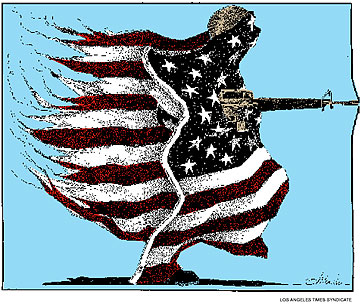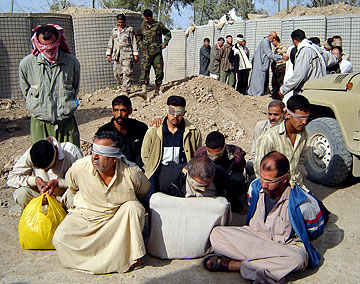
Fighting blind
The fight in Iraq isn't a War on Terrorism at all. Until the real enemy is defined and the right weapons deployed, America will not succeed.
By Llewellyn D. Howell
Special to the Star-Bulletin
IS THERE a 'War on Terrorism'?
President Bush and many Republicans continually refer to everyone not on our side in Iraq as "the terrorists." Unfortunately, this has been directly appropriated by every government that wants to get in on "the War on Terrorism" as a way of fighting old tribal enemies, killing off longstanding insurgents and suppressing minorities. The War on Terrorism has morphed into the War on Resistance. Now the United States, China, Russia, Thailand, the Philippines and India are all fighting "terrorists." Coincidentally, all of the terrorists are Muslims.
There are so many problems in the Bush administration's pursuit of terrorists these days that it is difficult to know even where to begin the list. But key among them is the fact that there isn't really any war at all on terrorism. You can't have a war against a concept. It didn't work with the War on Poverty and it will never really go anywhere with terror, either.
The fact that there is no War on Terrorism is reflected in the Bush administration's conflating of the war in Iraq with the War on Terrorism. In his ongoing effort to achieve simple common denominators, Bush glosses over the obvious complexity of who is at war in Iraq and, in the meantime, misidentifies who our forces should be fighting, helps create the very havoc that fosters terrorism and misses the opportunity to combat actual terrorists. It's no wonder that we're losing the war in Iraq and failing to make any inroads on the spread of terrorism.
We seem to know neither who it is we are fighting nor what it is we should do to fight them. Identifying where it is that we are fighting the War on Terrorism is most of the game. Locating the war should involve locating where it is that terrorists actually are.
They are not in Iraq. The fighting there is not the War on Terrorism. A win in Iraq by the United States -- even once we determine what a "win" is -- will not be a defeat for terrorists (although a loss will help them in their recruitment), and Islamic terrorists will continue attacking the United States and the non-Muslim developed countries and their multinationals whatever the Iraq outcome.
What is terrorism?
Bush and Secretary of Defense Donald Rumsfeld should have started with a definition of terrorism instead of using it as a stupifyingly simple pejorative. From 9/11 on, Bush has intentionally commingled terrorism with revolution, rebellion, criminality, ethnic conflict, anarchy, war and evil.
Louise Richardson, in her book "What Terrorists Want" (Random House, 2006), draws from her decades-long study of terrorism to define it with seven components.
» First, a terrorist is politically (or religiously) inspired.
» Second, a terrorist act involves violence.
» Third, the point of a terrorist act is to send a message, that is, induce terror, not to kill the enemy. Incidental deaths are likely but terrorists target symbols and systems.
» Fourth, in doing this, the act and the victim have symbolic significance. The psychological impact has to be greater than the physical act.
» Fifth, terrorism is an act of individuals or groups, not nation-states. If a nation-state commits a violent act, it is war, not terrorism.
» Sixth, in a terrorist act the victim of the violence and the target audience that the terrorist is trying to reach are not the same. Terrorists want to inculcate fear in a much larger population than just the few (even 3,000) whom they can kill. Terrorists' objectives are far beyond the reach of weapons and are often multidimensional (political, religious, social, economic, universal and/or global.
» Last, there is no soldier class in terrorism. Anyone can carry out a terrorist act and anyone can be a victim. We are far beyond lines of musket-firing professionals in uniform, whether red or camouflage. Civilians are the preferred targets.
Whom are we fighting?
Let's face facts. The terrorists we are fighting today are radical Muslims. At the fringe there are some attempted exceptions, namely the Philippines' effort to rename the communist rebellion that has been going on for 50 years as "terrorism." But we are not worried about any secular, Buddhist, Hindu, Christian, Jewish or Green terrorists (although there are a few of all of these). The sources of the many plots against the West (including Russia) are rooted in the Islamic world.
Fifteen of the 19 hijackers who attacked America on Sept. 11, 2001, were Arabs from Saudi Arabia, as is Osama bin Laden. Few of those we have identified officially as terrorists are from other religions and cultures. Five ethnic Uighurs (Muslims) from China were held at Guantanamo but recently were released to Muslim Albania. Were they terrorists? Or still separatists fighting for independence of the 100 million or so Muslims from Beijing's control?
In attacking Afghanistan in 2001, the United States and its allies went after the support system for a terrorist organization, al-Qaida, and after one leader, bin Laden. The individual proved illusive and the support system was far more deeply embedded than just the Taliban in the government. After sitting for five years in the deep shadow of the Iraq invasion, Afghanistan appears to be no more stable nor progressive nor violence-free than it was five or 10 or 20 years ago.

ASSOCIATED PRESS
U.S. soldiers continue to face difficulties controlling Iraq's warring factions. Blindfolded terrorist suspects were grouped together last Tuesday in an Iraqi army base in Baqouba, 35 miles northeast of Baghdad.
|
|
Allies and enemies
Bob Woodward notes in his recent "State of Denial" (Simon & Schuster, 2006) that President Bush refused to look (or couldn't look) beyond the simplest of divisions of his own religious belief, that the world was divided into good and evil. The United States and Great Britain invaded Iraq to rid the world of an evil Saddam Hussein without taking the time -- or maybe having the ability -- to understand the very gray world of political violence. They ended up with an array of physical and psychological conflicts but employing a unidimensional and unadaptive tool -- a conventional army looking for the enemy.
But the opposing forces in Iraq are not a single entity. What we face is a complex configuration of sometime allies, often enemies and occasional opportunistic bystanders. To have any hope of success against terrorists, we have to differentiate among and understand the differences among the various groups:
» Arab Sunnis. A relatively small minority in Iraq who, behind Saddam Hussein (the Baathists), brought unity to Iraq for decades. Not terrorists but willing to shoot Americans who get in the way.
» Arab Shia. A long-oppressed minority with a visceral hatred of the Sunnis that is based on a millennium of growing religious conflict with the larger global Sunni sect. Not terrorists, willing to shoot Americans but more interested in killing Sunnis.
» Insurgents. A growing number of Iraqis, mostly Arabs, who see the Americans as an interfering force and foreign dominator. Includes both Sunnis and Shia.
» Kurds. Sunnis but not Arabs, a separate ethnic group that already has some autonomy from the Iraqi government.
» Militias. Fighters aligned with particular schools of religious thought in Iraq. They are defenders of a particular sectarian faith and are as likely to fight each other as national armies or the Americans.
» Tribes. Either Shia or Sunni but with local interests first.
» Criminals. There were criminals, both petty and organizational, in Iraq before the arrival of the Americans in 2003. They can be from any ethnic group. By naming anyone who opposed the U.S-led invasion as criminals -- as President Bush did early on -- the distinction was lost regarding motivation in acting against the United States forces. But criminals don't commit suicide.
» Foreign fighters. Islamist Jihad has become the romantic as well as religious adventure for those without purpose in life. Jihad gives direction and maybe salvation. Since the foreign fighters blend into the al-Qaida-directed efforts, we can cast them as terrorists although their motivation is initially quite different.
» Al-Qaida in Iraq. These are some of the terrorists. Their numbers are small but their reach is great because they have direction, religious conviction, political organization and financing. They know how to play the other actors in Iraq and Afghanistan. But al-Qaida in Iraq is only a manifestation of a much larger school of thought that has adherents throughout the Islamic world. Al-Qaida and Islamic terrorists generally have sympathizers in Indonesia, Malaysia, Thailand, the Philippines, Pakistan, Nigeria and other countries outside the Arab world, as well as throughout the Arab Middle East.
Troops fight armies, whether they are bands, clans, tribes, militias, companies or battalions. They can't fight ideologically based conspiracies. And a conspiracy only takes two. A terrorist conspiracy can take a week to mature or 20 years. There's no hurry. Motivation to commit an act of terrorism that will have the desired effect is the key.
Doing it the right way
A War on Terrorism has to attack three things.
» First, it has to try to find conspiracies and conspirators, as in the search for bin Laden and the al-Qaida leadership. This leadership has, of course, long ago transformed into a greatly dispersed semi-organization with many heads, and Osama might even be dead. This search involves intelligence organizations, not soldiers. An obtrusive search risks alienating the very populations that a War on Terrorism is supposed to protect, witness the issues of tapping phones and the suspension of habeus corpus in some circumstances in the United States.
» Second, a War on Terrorism needs to be pursued in the global financial systems through which the many plots are funded. For example, a radiation bomb attack on a major U.S. harbor through use of a container or a small ship involves payments for support of a small crew (maybe five to seven members), purchase of a ship and fuel, bribes for port disguises and exits, purchase of a radiation bomb and ancillary materials, and other support systems (phones, communications). The money has to come from somewhere and be processed.
» Third, a War on Terrorism has to be pursued against the ideological and religious motivation of terrorists. We can never capture, imprison or kill them all, especially when they enjoy a global distribution. Somewhere, somehow we have to be able to stop them from being created. There is good evidence that there are more willing terrorists in the Islamic world now than there were before we invaded Iraq.
A War on Terrorism has to address the religious, cultural, educational and economic circumstances from which terrorists arise. Are we now really pursuing such a war? Or are we simply grabbing at the oil slick fringes in Iraq?
Llewellyn D. Howell is director and senior research fellow of the Asia Pacific Risk Institute at the University of Hawaii-Manoa's College of Business Administration.

